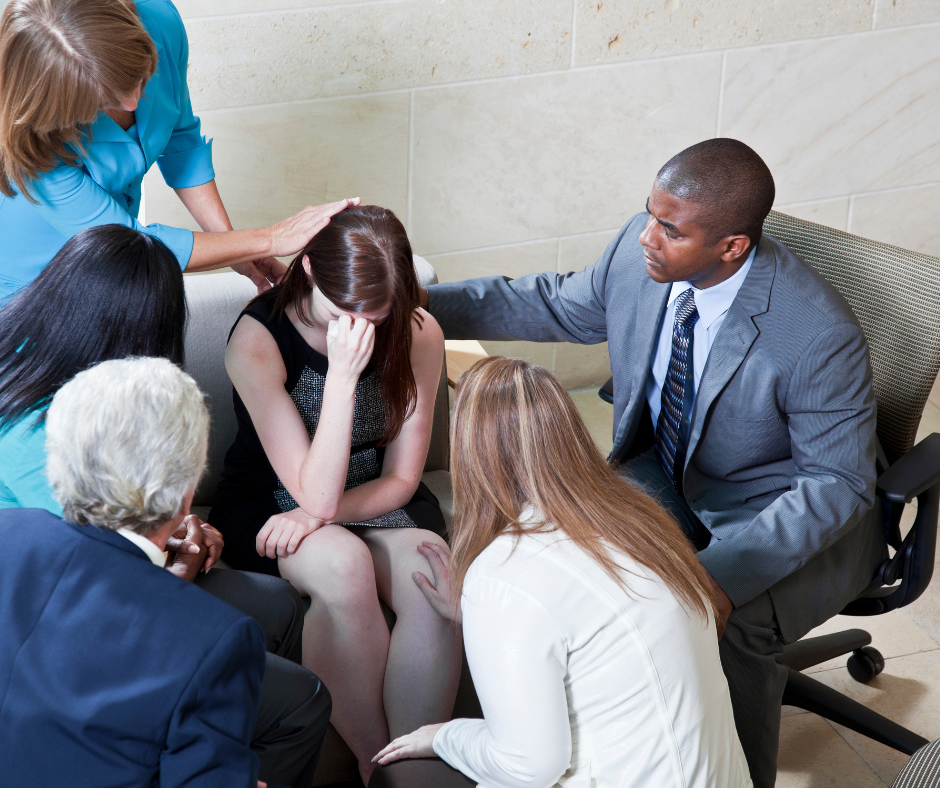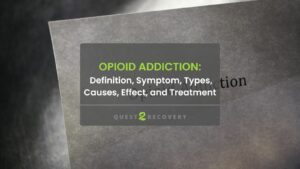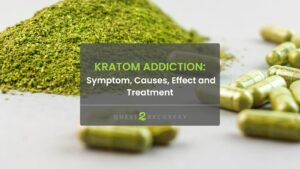Key Takeaway:
- Recognize the different types of grief and loss that can occur during addiction recovery, including the loss of relationships, identity, and a sense of control.
- Understand the emotional and mental impact that grief and loss can have on addiction recovery and the challenges that come with overcoming them.
- Coping strategies such as developing effective techniques for stress reduction, seeking professional support and help, and emphasizing self-care can help in overcoming grief and loss during addiction recovery.
Are you struggling to heal from the grief and loss from addiction? It can often be a difficult and painful journey, but you can find hope in the recovery process. Here, we’ll explore how to effectively manage grief during addiction recovery.
Understanding the Different Types of Grief and Loss
Losing someone or something dear to us is a natural part of life, and with that comes feelings of grief and loss. Understanding the different types of grief and loss can help us navigate through these intense emotions more efficiently, especially when dealing with addiction recovery. Grief can come in various forms, such as from the death of a loved one, the end of a relationship, or even losing a job. While many people have some idea about what causes grief and loss, they may not fully understand the nuances behind each type.
Understanding the Different Types of Grief and Loss requires an understanding of how our brains respond to emotional trauma. The amygdala is responsible for our primal responses, including fear and anger. When we experience loss or trauma, it triggers our amygdala to release stress hormones within our body, which can lead to changes in mood and behavior. Our prefrontal cortex then takes over to process these emotions so that we can understand them better. However, when we are struggling with addiction recovery simultaneously, it can be challenging to manage these strong emotions.
As we move on from this primal response stage towards healing after experiencing a loss successfully, there are different ways in which people cope concerning their grief journey. Some people may exhibit signs of physical pain or numbness while others go through extreme anxiety or depression episodes. It is not uncommon for people suffering from addiction during this phase to relapse into their old habits as they try to escape from overwhelming emotions.
Did you know that men and women deal with grief differently? Men tend towards repression while women tend more towards rumination. In other words, men are less likely to open up about their feelings or ask for help whereas women feel comfortable sharing their emotional struggles more openly.
Understanding the different types of grief during addiction recovery is the first step in seeking appropriate treatment methods that best align with your unique situation – You cannot heal what you don’t acknowledge! Next up: Recognizing the Impacts of Losses on Addiction Recovery, because we all know dealing with addiction recovery comes with its own set of challenges!
Recognizing the Impact of Losses on Addiction Recovery
Recognizing the Impact of Losses on Addiction Recovery is crucial to lead a positive and healthy lifestyle after rehab. Substance abuse recovery entails rebuilding multiple aspects of life, which includes processing grief and loss that often initiate addictive behaviors. It is essential to recognize how an individual’s previous losses affect their addiction and recovery.
Recognizing the Impact of Losses on Addiction Recovery is often challenging for individuals who are dealing with alcohol or drug dependency. They may be oblivious to the fact that their past losses have contributed immensely to their addiction struggles. However, it is imperative to understand that unresolved emotions associated with grief and losses can facilitate addiction.
Furthermore, Recognizing the Impact of Losses on Addiction Recovery triggers a natural adjustment process in individuals’ minds. The mindful process prompts one to understand how one’s past trauma has contributed to current behavioral patterns better. This allows patients to work towards healing and reconciling past traumas.
Recognizing the Impact of Losses on Addiction Recovery makes it easier for people undergoing recovery by shedding light on significant healing factors beneficial for future sobriety issues. An essential step in accepting an individual’s vulnerability and seeking help from peers or counselors who specialize in such cases comes from recognizing and understanding such impacts.
Don’t miss out on this critical component of addiction recovery; emphasizing Recognizing the Impact of Losses on Addiction Recovery is what could entirely enhance your recovery journey!
The intricacies of dealing with trauma in addiction recovery can be overwhelming; let’s unpack its effects together!
The Effects of Grief and Loss on Addiction Recovery
In this discussion, we’ll explore two critical sub-sections regarding the intersection of grief and addiction:
- Recognizing the emotional and mental impact that grief can have on addiction recovery, and
- Understanding the unique challenges of overcoming grief while in addiction recovery.
These topics are crucial components of a holistic and effective addiction recovery plan.
Recognizing the Emotional and Mental Impact of Grief on Addiction Recovery
Recognizing the emotional and mental impact of grief on addiction recovery is essential for a successful and long-lasting recovery journey. When individuals experience loss or grief, it can trigger intense emotions and feelings that may interfere with their addiction recovery process. It is crucial to understand how this happens and why it’s necessary to recognize these impacts.
The emotional and mental impact of grief during addiction recovery can be detrimental if not addressed adequately. Grieving over a significant loss such as a loved one or a relationship can create voids that an individual tries to fill with drugs or alcohol. Self-medicating becomes an easy escape from the pain of grieving, but it only leads to more intense emotions.
Recognizing the emotional and mental impact of grief means acknowledging that healing from substances alone may not be enough. An individual needs to acknowledge their underlying mental health issues in dealing with withdrawal symptoms while grieving. Unaddressed grief could lead to relapse or even suicide attempts.
In some cases, addicted individuals hold onto their addiction because they relate it to their lost loved one, making it difficult for them to recover fully. Research shows that 16% of people who use opioids had experienced the death of someone dear in the past year (SAMHSA report).
Understanding the challenges of overcoming grief during addiction recovery is crucial in comprehending how it all fits together. Let’s dive deeper into how someone facing this challenge must deal with it effectively without risking relapse.
Understanding the Challenges of Overcoming Grief During Addiction Recovery
Grief is often an overlooked challenge faced by those in addiction recovery. It can be a trigger that leads to relapse or hinder the progress of those who are trying to overcome their addiction. Understanding the challenges of overcoming grief during addiction recovery becomes crucial for a successful path towards sobriety.
The process of overcoming grief during addiction recovery involves acknowledging and processing the emotions related to the loss or trauma. Substance abuse could have been used as a coping mechanism for handling these uncomfortable feelings, leading to prolonged use and subsequent addiction. Moreover, withdrawal from drugs or alcohol can lead to further emotional distress, making it difficult for individuals to manage their grief while also managing their withdrawal symptoms.
Studies show that people who experience significant emotional trauma or unresolved emotional pain have a higher chance of developing substance abuse disorders. This highlights the importance of addressing underlying emotional struggles in addiction recovery.
In addition, cultural factors, experiences with stigma and shame, or insensitivity from friends and family members can make it harder for individuals struggling with addiction and grief to seek help. These factors need to be addressed if we want more people recovering from addiction.
Coping with Grief and Loss During Addiction Recovery
In the process of addiction recovery, the experience of grief and loss can be all-consuming. That’s why it’s important to develop effective coping strategies that can help us navigate these difficult emotions. In this part of the article, I’ll share some strategies that have helped me overcome grief and loss during my own addiction recovery journey. We’ll explore ways to seek professional support and help during the recovery process, as well as emphasizing self-care and stress reduction techniques that can help us move towards healing.
Developing Effective Coping Strategies to Overcome Grief and Loss
Coping with grief and loss is a challenging process that can affect individuals in multiple ways. It involves the development of effective coping strategies, which are designed to help people overcome their feelings of sadness and depression resulting from a devastating event such as the loss of a loved one. Developing these strategies requires patience, resilience, and determination, mainly when going through addiction recovery.
Effective coping strategies work by redirecting negative emotions towards more productive and healthy behavior while allowing time for healing. These strategies include physical practices such as exercise, yoga, or meditation, reading books, or listening to music that promotes feelings of peace and tranquility or indulging in creative hobbies such as painting or writing. The reasons behind these methods lie in their capacity to shift focus from negativity to positivity while engaging the individual in mindful activities that promote relaxation.
It is essential to understand that everyone’s healing process is unique, requiring different approaches for coping with grief and loss during addiction recovery. While some people might lean towards physical practices like exercise or meditation for healing, others may find meaning through volunteering or joining support groups.
Seeking Professional Support and Help During the Recovery Process
Dealing with grief and loss can be an overwhelming experience, especially for those who are in addiction recovery. It is essential to seek professional support and help during the recovery process to gain a better understanding of how to cope with it.
Seeking professional support and help during the recovery process is crucial as it helps individuals understand the emotional turmoil they may face. It provides a safe space for them to express their feelings without judgment, leading to healing and growth. Professional counselors are trained to offer unbiased opinions while providing suitable coping strategies, leading to a faster recovery.
People seeking professional support have reported better outcomes in managing grief, reduction of addictive behaviors, and overall improvement in mental health. Support groups such as Alcoholics Anonymous (AA), Narcotics Anonymous (NA), or private counseling sessions offer comprehensive services tailored towards individual needs. This early intervention reduces the risk of relapse while maintaining sobriety.
Moreover, seeking professional support provides access to various resources that one might not have known about otherwise. From structured programs to community activities designed around specific hobbies or interests, the options offered by these experts provide new opportunities for self-discovery outside of addiction.
A study conducted by The Journal of Substance Abuse Treatment showed that individuals who sought out counseling had a higher success rate towards achieving long-term recovery goals than those who didn’t seek any help. Therefore it’s imperative for people undergoing addiction treatment to consider seeking help from professionals.
Emphasizing Self-Care and Stress Reduction Techniques for Overcoming Grief and Loss
Taking care of yourself during periods of grief and loss can be critical for maintaining emotional and physical well-being. In addiction recovery, this is even more essential, as the emotions that come with the grieving process can trigger a relapse. Therefore ‘Emphasizing Self-Care and Stress Reduction Techniques for Overcoming Grief and Loss’ is crucial to prevent any relapses and maintain sobriety during these times.
Self-care techniques work by providing individuals with healthy coping options to help them manage their emotions better. These techniques may include meditation, yoga or exercise, deep breathing exercises or relaxation techniques such as aromatherapy. The reason why it works is that self-care empowers individuals to take control of their life while reducing feelings of powerlessness and hopelessness.
It’s crucial to keep in mind that self-care isn’t just about developing healthy routines; it’s also about setting boundaries, identifying priorities and asserting our needs in relationships or situations where we might have lost our sense of autonomy. These small efforts take us from victimhood to survivorship, giving us strength to face difficult days ahead.
Pro Tip: Don’t forget the basics! Make sure you’re sleeping well, drinking plenty of water, eating nutritious foods, staying connected with loved ones through phone calls or video chat even when social distancing keeps you apart.
In times like these when we are processing deep emotions surrounding grief and loss simultaneously undergoing addiction recovery can be tough. It’s important not to underestimate how challenging it can be to go through both situations at once since stress levels can heighten consequentially leading up into relapsing into addictive behavior very easily. In the next section ‘Overcoming Grief and Loss During Addiction Recovery,’ we will talk about ways in which you can manage your grief while working on healing from addiction in a balanced way while taking care of yourself first!”
Overcoming Grief and Loss During Addiction Recovery
It can feel daunting, but there is hope. We’ll be breaking down the key aspects of this journey into sub-sections, beginning with finding meaning and purpose in the recovery process because this is vital in ensuring long-term recovery is successful. Additionally, we’ll be covering building a strong support system because resilience and recovery can only be fostered with the help of the right people. Lastly, we’ll be discussing how finding positive outlets for expression, growth, and recovery is an essential aspect of overcoming grief and loss during addiction recovery.
Finding Meaning and Purpose in the Recovery Process
Finding meaning and purpose in the recovery process is a crucial step for individuals dealing with grief and loss during addiction recovery. It’s not enough to simply give up addictive behaviors; we must also find new ways to create a fulfilling life without them. This is where finding meaning and purpose comes in.
Finding meaning and purpose involves identifying personal values, skills, interests, and goals that align with an individual’s identity outside of their addiction. It’s about creating a sense of purpose or direction beyond simply staying sober. When individuals can identify what matters most to them, they are more likely to make choices that support their recovery.
Research shows that finding meaning and purpose can help individuals stay motivated during the difficult stages of recovery, reduce boredom and restlessness, increase self-esteem, decrease symptoms of depression and anxiety, and improve overall quality of life. Additionally, it can provide a sense of connection to something larger than oneself.
One approach to finding meaning and purpose is through self-exploration activities such as journaling, creative projects, or identifying personal strengths. Another approach is through spirituality or religion that helps connect individuals to a higher power or moral code. For some individuals volunteering or helping others can also be meaningful activities that support their well-being.
Building a Strong Support System to Foster Resilience and Recovery
Building a strong support system to foster resilience and recovery is crucial for those who are dealing with grief and loss during addiction recovery. It helps them cope with the challenges and encourages them to stay on track towards healing.
A strong support system can consist of family, friends, support groups, therapists, spiritual leaders or anyone else you trust and feel comfortable confiding in. The idea behind this system is simple; it creates a safe space for individuals where they can express themselves freely, without being judged or ridiculed. Having a sense of belonging within the community helps people feel valued and supported, which in turn will help them develop a strong sense of self-esteem.
Studies suggest that people who have little or no supportive relationships are more likely to develop depression, anxiety and other mental health problems. Building a strong support system provides an opportunity for individuals to talk about their grief and loss experiences with others who might have gone through similar situations. This helps them understand that they are not alone in their struggles, giving them the courage to keep pushing forward.
For some, building a supportive network may be challenging given their personal circumstances or geographical location. However, thanks to technological advancements such as online forums and social media platforms like Facebook groups, finding someone who can offer non-judgmental listening may be easier than you think.
Pro Tip: Although it is essential to build a support system comprising of people we trust and feel comfortable speaking too; we should also focus on developing skills like self-compassion, mindfulness meditation which create an internal supportive relationship with oneself which can contribute equally toward fostering resilience.
Finding Positive Outlets for Expression, Growth, and Recovery
Finding positive outlets for expression, growth, and recovery is a crucial aspect of addiction recovery. It’s not just about getting rid of addictive behavior; it’s also about improving oneself in different areas. By finding positive outlets, one can achieve personal growth while developing new and healthier coping mechanisms.
Positive outlets can be anything that encourages healthy behavior. For example, yoga, meditation, sports activities or community service. Engaging in activities that bring joy and relaxation can foster a sense of self-discovery leading to an increase in overall well-being. These activities have lasting effects on mental health and increased self-esteem. The reason for their effectiveness lies in the fact that when people participate in activities they enjoy or benefit from, they’re busy experiencing happiness instead of dwelling on negative emotions like sadness or anxiety.
Furthermore, outdoor activities are known to be universally beneficial to physical and mental health. Walking through nature has been proven to reduce negative symptoms such as stress levels and poor mood states; thereby promoting good mental health as well as physical benefits such as weight loss goals being achieved with regular activity time spent outside.
In addition to these benefits, taking part in group activities promotes building relationships too. Examples include meetings with support groups for addiction recovery where individuals can connect with others going through similar situations which can lead to feelings of belongingness This helps create wider support networks which promote the idea of staying sober over extended periods.
Embark on a Life-Changing Journey with Quest 2 Recovery
In conclusion, navigating the path of recovery from addiction is a journey that requires support, dedication, and the right resources. Quest 2 Recovery understands the unique challenges faced by individuals in this journey and offers a comprehensive range of services tailored to meet these needs. Don’t let addiction control your life any longer. Take the first step towards a healthier, happier future by reaching out to Quest 2 Recovery. Their compassionate and experienced team is ready to help you build the foundation for lasting recovery. Contact Quest 2 Recovery today and embark on the path to reclaiming your life.
Some Facts About Dealing with Grief and Loss During Addiction Recovery:
- ✅ Grief and loss are common experiences for those in addiction recovery, as they may have lost relationships, opportunities, and even their former selves. (Source: Verywell Mind)
- ✅ The five stages of grief (denial, anger, bargaining, depression, acceptance) also apply to the process of addiction recovery. (Source: AddictionCenter)
- ✅ It is important for individuals in addiction recovery to seek support from their peers, therapists, and other professionals and to engage in self-care activities to help manage grief and loss. (Source: American Addiction Centers)
- ✅ Coping with grief and loss during addiction recovery can be challenging, but practicing mindfulness and staying focused on the present moment can be helpful. (Source: Hazelden Betty Ford Foundation)
- ✅ The process of grieving and accepting losses can help individuals in addiction recovery move forward and focus on building a healthier future. (Source: The Recovery Village)
FAQs about Dealing With Grief And Loss During Addiction Recovery
What are some common emotions that arise when dealing with grief and loss during addiction recovery?
It is normal to experience a range of emotions when dealing with grief and loss during addiction recovery. Some common emotions include sadness, anger, guilt, loneliness, and even relief.
How can I cope with grief and loss during addiction recovery?
There are several ways you can cope with grief and loss during addiction recovery. Some strategies include seeking professional counseling, practicing self-care activities, joining a support group, and surrounding yourself with supportive friends and family.
What are some common triggers that may cause grief and loss during addiction recovery?
Some common triggers that may cause grief and loss during addiction recovery include the loss of a loved one, the end of a relationship, financial or legal issues, and stress at work or school.
What are the risks of not addressing grief and loss during addiction recovery?
Ignoring or suppressing feelings of grief and loss during addiction recovery can lead to negative consequences such as relapse, depression, anxiety, and other mental health issues.
How can I support a loved one who is dealing with grief and loss during addiction recovery?
You can support a loved one who is dealing with grief and loss during addiction recovery by acknowledging their feelings, offering emotional support, encouraging them to seek professional help, and participating in self-care activities with them.
What should I do if I am struggling with grief and loss during addiction recovery?
If you are struggling with grief and loss during addiction recovery, it is important to seek professional help from a therapist or counselor trained in addiction recovery. You can also reach out to support groups such as Alcoholics Anonymous or Narcotics Anonymous for additional support.












